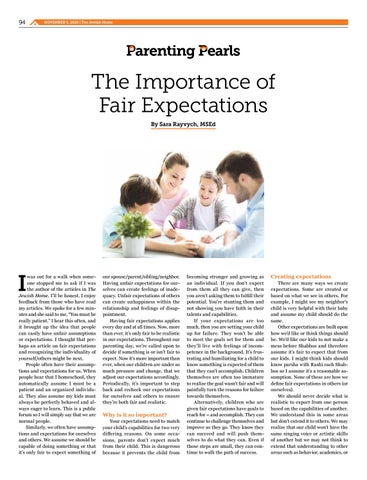94 54
NOVEMBER 5, 2020 | The Jewish Home OCTOBER 29, 2015 | The Jewish Home
Parenting Pearls
The Importance of Fair Expectations By Sara Rayvych, MSEd
I
was out for a walk when someone stopped me to ask if I was the author of the articles in The Jewish Home. I’ll be honest. I enjoy feedback from those who have read my articles. We spoke for a few minutes and she said to me, “You must be really patient.” I hear this often, and it brought up the idea that people can easily have unfair assumptions or expectations. I thought that perhaps an article on fair expectations and recognizing the individuality of yourself/others might be next. People often have their assumptions and expectations for us. When people hear that I homeschool, they automatically assume I must be a patient and an organized individual. They also assume my kids must always be perfectly behaved and always eager to learn. This is a public forum so I will simply say that we are normal people. Similarly, we often have assumptions and expectations for ourselves and others. We assume we should be capable of doing something or that it’s only fair to expect something of
our spouse/parent/sibling/neighbor. Having unfair expectations for ourselves can create feelings of inadequacy. Unfair expectations of others can create unhappiness within the relationship and feelings of disappointment. Having fair expectations applies every day and at all times. Now, more than ever, it’s only fair to be realistic in our expectations. Throughout our parenting day, we’re called upon to decide if something is or isn’t fair to expect. Now it’s more important than ever, when our children are under so much pressure and change, that we adjust our expectations accordingly. Periodically, it’s important to step back and recheck our expectations for ourselves and others to ensure they’re both fair and realistic.
Why is it so important? Your expectations need to match your child’s capabilities for two very differing reasons. On some occasions, parents don’t expect much from their child. This is dangerous because it prevents the child from
becoming stronger and growing as an individual. If you don’t expect from them all they can give, then you aren’t asking them to fulfill their potential. You’re stunting them and not showing you have faith in their talents and capabilities. If your expectations are too much, then you are setting your child up for failure. They won’t be able to meet the goals set for them and they’ll live with feelings of incompetence in the background. It’s frustrating and humiliating for a child to know something is expected of them that they can’t accomplish. Children themselves are often too immature to realize the goal wasn’t fair and will painfully turn the reasons for failure towards themselves. Alternatively, children who are given fair expectations have goals to reach for – and accomplish. They can continue to challenge themselves and improve as they go. They know they can succeed and will push themselves to do what they can. Even if those steps are small, they can continue to walk the path of success.
Creating expectations There are many ways we create expectations. Some are created or based on what we see in others. For example, I might see my neighbor’s child is very helpful with their baby and assume my child should do the same. Other expectations are built upon how we’d like or think things should be. We’d like our kids to not make a mess before Shabbos and therefore assume it’s fair to expect that from our kids. I might think kids should know parsha with Rashi each Shabbos so I assume it’s a reasonable assumption. None of these are how we define fair expectations in others (or ourselves). We should never decide what is realistic to expect from one person based on the capabilities of another. We understand this in some areas but don’t extend it to others. We may realize that our child won’t have the same singing voice or artistic skills of another but we may not think to extend that understanding to other areas such as behavior, academics, or
























